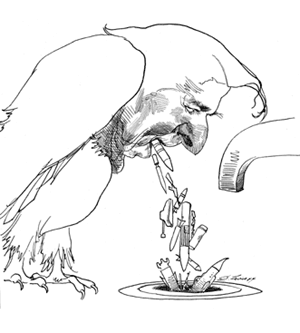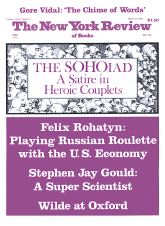On February 8, the chairman of the Federal Reserve Board, Paul Volcker, testifying to the House Budget Committee, said that we were “playing Russian roulette” with our economy. The stock market, which had been in an increasingly nervous state for the previous several weeks, quickly went into a steep decline, prompting Mr. Volcker, the next day, to calm things down by saying that the market had “overreacted.” The chairman was right the first time, however, and so was the stock market; we are indeed playing Russian roulette with the economy. We are doing so by allowing our budget to go out of control, by allowing the international monetary system to go out of control, and by allowing the rapid industrial adjustment that is occurring now to take place without the slightest attempt to guide its direction or to dampen its shocks.
The economy’s strong rebound from the 1981-1982 recession has provided us with an opportunity to take actions that could put the economy on a sounder basis for a long time to come. These actions would require statesmanship and courageous political leadership from the executive and the legislative branches of the government, from both Republicans and Democrats. They would require a change from the economic and social Darwinism that is the current philosophical position on the appropriate role of government in our society. Since none of these actions seems likely to be taken in the near future, the opportunity will probably vanish. When you play Russian roulette, sooner or later there will be a live round in the chamber.
1.
Let us first look at our financial management. Our national debt currently stands at about $1.4 trillion; it was about $500 billion in 1975 and $280 billion in 1960. It will be about $2 trillion by 1986 and will continue to grow. Practically any forecast of deficits based on the budget submitted by the administration shows that additional borrowing of between $750 billion and $1 trillion will be required over the next five years. We have been able to borrow the huge amounts required by our budgetary deficits by attracting foreign capital with our high interest rates. We have become the largest borrower on the international markets. The result is an overvalued dollar which is destroying our export industries as well as those of our domestic industries (automotive, steel, etc.) that must compete with imported products. Borrowing on such a scale makes us vulnerable to the suppliers of foreign capital just as we have been vulnerable to the suppliers of foreign oil.
This Issue
March 29, 1984






